infoNET NEWSLETTER
The infoNET Newsletter helps advocates with disabilities stay up to date on current issues in the Legislature, the governor’s office, and U.S. Congress. It also provides information on how to be a more effective advocate, how to connect with other advocates, and when there are opportunities to bring your issue to the attention of lawmakers and opinion leaders.
Current Newsletter PDF
Go to Newsletter Archives
Spring Issue | May 2, 2024
This newsletter is published quarterly. For more current information, check out our
weekly reports during the legislative session and
breaking news.
Iowa Legislative Session Ends
Legislators wrapped up their work for the year in the early morning hours of Saturday, April 20. It took them 104 days to introduce 1,617 new bills and pass an $8.9 billion budget for the upcoming year. That is just a 4% increase over the current year’s budget. There is some good news in this year’s budget for Iowans with disabilities and the individuals who support them.
One out of every ten bills introduced this year made it through the entire legislative process. Legislators sent 169 bills to the Governor and she has signed about half of them into law. Governor Reynolds has until May 20 to sign or veto bills. She has one other option for budget bills. She can take out parts of a budget bill while still signing the rest of it into law. This is called a “line item veto” and it is only allowed in budget bills.
Iowa DD Council’s Bill Tracker is updated as soon as the Governor takes action on bills. Check it to see which bills made it through the session, which bills did not make it, and which bills are signed into law. You may want to work on bills that did not make it through the process next year.
Good News in 2025 Budget
Plain Language Summary: 2025 Budget
Legislators cut funding for AEAs by $22.5 million. Legislators increased funding for the following programs and services:
$14.5 million for HCBS waiver rates $420,000 for physical therapists
$3 million for home health services $65,000 for occupational therapists
$3 million for new psychiatric medical institution for children (PMIC) $370,000 for PMIC tiered rates
$2.1 million for behavioral health $300,000 for community mental health centers
$1.7 million for ID waiver waiting list $144,000 for medical equipment
$1.4 million for residential supported community living $14 million for paraeducator salaries
$1.3 million for state park accessibility $10 million for the new Special Education Division
$1 million for recreational trails $120,007 for vocational rehabilitation
$750,000 for applied behavior analysis
In the final days of session, legislators agreed to increase spending on state programs and services by 4%. There is good news in the Health & Human Services (HHS) Budget. Legislators invested $14.5 million to increase payments to providers of home and community based services (HCBS). That is a 5% increase in Medicaid rates. This is in addition to the $16.5 million they had to add to the budget this year to replace the federal funds used two years ago to increase rates.
Legislators also put in another $1.4 million to help raise rates for residential-based supported community living (RBSCL). They hope this will help bring more children placed out of state back to Iowa and closer to their families. An additional $1.7 million was added to remove Iowans from the intellectual disability (ID) waiver waiting list and give them access to services. According to Rep. Joel Fry, who chairs this budget, the additional funding will give 70 individuals with intellectual disabilities access to waiver services. That is about $67,700 per year, per person with federal match.
Legislators also showed commitment to behavioral health by increasing reimbursement rates by $2.1 million and another $7.8 million spread out among community mental health centers, psychiatric medical institutions for children (PMICs), applied behavior analysis, home health services, and rates for physical and occupational therapists.
The Education Budget also included a $120,007 increase for vocational rehabilitation services. This may not seem like a lot, but with the federal match it is more than $500,000 in additional funding for these services. Legislators added $1.3 million to help make state parks and recreation areas more accessible to Iowans with disabilities and an extra $1 million for recreational trails.
The bill to change special education and funding for the Area Education Agencies (AEA) also had an impact on the state budget. AEA funding was reduced by $22.5 million and the Department of Education’s budget was increased by $12.2 million. This includes $2.2 million to take over professional development and $10 million for the new Division of Special Education. It took until the final budget (called “Standings”) to get the $14 million added for paraeducator salary increases. This was part of the promises made in the AEA bill.
The Big Three: Legislators Reform AEAs, Behavioral Health & Disability Services, State Boards
Plain Language Summary: Three Reform Bills
- Legislators passed three big reform bills in 2024.
- HF 2612 changes the way special education is funded and delivered.
- A Task Force will look at ways to improve special education.
- No changes in AEA special education funding this year.
- Beginning July 1, 2025, AEAs will only receive 90% of special education funds. Schools will keep 10% to purchase services from any provider.
- Teacher salaries are increased over two years, with starting pay at $47,500 this year and $50,000 next year.
- Experienced teachers will see salaries starting at $60,000 this year, $62,000 next year.
- The state will have a new Division of Special Education with 61 employees (all but 12 will work out of the AEA).
- HF 2673 changes how regional behavioral health and disability services are delivered.
- There will be six new behavioral health districts beginning July 1, 2025.
- Behavioral health districts will be managed by an Administrative Services Organization. ASOs cannot be for-profit companies.
- Ten-member advisory boards that include three individuals with lived experience will guide district ASOs.
- HHS will designate new Aging & Disability Resource Centers (ADRCs).
- ADRCs will coordinate services for individuals with disabilities, chronic mental illness, and older Iowans.
- · SF 2385 reduces the number of state boards and commissions.
- State boards/commissions will be reviewed every four years and they no longer need to be gender balanced.
- Boards must give members a virtual option to participate.
- HHS Council members will be paid $10,000/year.
- Boards of behavioral health, psychology, and social work are merged.
- Dual Party Relay Council & Commission on Deaf Services are combined.
- Several disability boards and commissions were eliminated, including the Brain Injury Advisory Council, Autism Council, Children’s Behavioral Health System Board, Commission on the Status of Persons with Disabilities, and MH/DS Advisory Committee. For full list click
here.
- A new Special Education Council is created with one special education teacher and six parents or guardians of students with disabilities.
- Legislators say they are open to making changes if they made a mistake. They say it’s a “work in progress.”
Legislators took on three big reforms this year. Changing the way Area Education Agencies (AEAs) are funded and the services they provide was the reform that took up the most time. It stopped progress on many other issues while legislators debated how special education would be funded and delivered. It is important to note that legislators heard from thousands of teachers, parents, and school board members about the changes proposed by the Governor. Many advocates of children with disabilities showed up at the Capitol to testify in meetings, built advocacy networks using social media, and showed up at town halls to talk about their concerns. The final compromise:
- Sets up a Task Force to review the AEA system. By the end of the year, they will recommend changes that improve student outcomes. They will also look at what to do with AEA property and review administrator salaries.
- Changes AEA special education funding. For the next year, there is no change in AEA funding for special education services except they must develop a price list for the services they provide. Beginning July 1, 2025, AEAs will continue to get 90% of the funding for special education services. Schools will get to keep 10% of the special education funding. Schools can use those funds to purchase additional services from an AEA or they can buy the services from other providers.
- Changes how other AEA services are funded. Beginning July 1, 2024, schools will keep 60% of the funding for education services and shared instructional materials (media services) and the AEA will retain 40%. Schools would decide where to purchase services with their share. After the first year, 100% of the funds for these services will be kept by the school and they will decide which services they want to buy from the AEA. The Department of Education will get all funding for teacher professional development. This service will be provided free to all public and private schools.
- Increases beginning teacher salaries on July 1, 2024, to $47,500 and again on July 1, 2025, to $50,000. Teachers with 12+ years of experience will see their salaries increased to $60,000 this year and $62,000 next year.
- Adds more state oversight to the AEA and special education system.
A new Division of Special Education is created in the Iowa Department of Education (DE). The new DE staff will include 12 employees based in Des Moines, 40 employees that work out of the AEAs, and 9 special education directors located in AEAs. The new division will set standards for AEAs, make sure they comply with state and federal laws, and encourage innovative models to meet student needs. The division will also develop a plan to help schools identify, evaluate, promote, and provide services that improve the experiences and outcomes of students with disabilities.
- Establishes new criteria for AEAs.
AEA Chief Administrator salaries are capped at 125% of the average superintendent salary for their area. AEAs will only be able to offer professional development services that are approved by the DE.
We will be watching how these changes impact special education. The DE will need to write new rules and the task force will begin its review of the system this summer. We will discuss how things are moving forward in our monthly
Capitol Chats. We will also post progress on social media. It is important to stay engaged in this, as legislators can always make additional changes in 2025.
The Iowa Department of Health and Human Services (HHS) spent over a year talking to stakeholders about the realignment of the regional behavioral health and disability services system. They held town halls and took stakeholder comments as bills were drafted. Regional mental health and disability services (MH/DS) system into behavioral health districts and aging and disability services areas.
- Regional mental health and disability services (MH/DS) will be separated into behavioral health districts and aging and disability service areas.
- Funding for regional mental health services, tobacco prevention initiatives, substance use disorder services, gambling addiction services, and federal behavioral health block grants will be combined and managed by a non-profit or local government agency (Administrative Services Organization, or ASO) in newly created behavioral health districts, beginning July 1, 2025.
- Regional non-Medicaid disability services currently paid by MH/DS regions will be moved into the Aging & Disability Resource Center (ADRC) model. Chronic mental illness, disability services, and aging supports will all be coordinated through new and existing ADRCs. This also begins on July 1, 2025, but funding for disability services will only continue through July 1, 2028. By that date, HHS will create a separate fund for ADRC services. The bill also states that all individuals with disabilities, including those with brain injuries and children, will be eligible for these supports. The ADRCs may be the same as the ASO, or they may be different.
- There will still be a behavioral health district advisory board providing guidance on the service system. The ten-member boards will include three elected officials, three professionals with experience in behavioral health services, three persons with lived experience (at least one of which must represent a family with a child needing behavioral health supports), and one member from law enforcement.
- Legislators froze funding for MH/DS regions this year, but the increases required by law will begin again next year. HHS points to nearly $40 million expected to be returned to the Incentive Fund this year from regions who are not spending all their funds.
- HHS will have an initial transition plan on their website by July 1, 2024. The public will be allowed to comment on this. By August 1, HHS will release behavioral health district maps. ASOs will be chosen before the end of 2024. There is no timeline on the transition to ADRCs, except that it too must be in effect by July 1, 2025. Legislators will be given a report on the transition when they come back into session January 13, 2025.
We will let you know when public comments are being accepted. We will provide more information about the transition plan this summer and fall through newsletters, social media, and our monthly Capitol Chats.
The final reform bill includes some of the Governor’s recommendations to merge or eliminate state boards and commissions. A separate bill already signed into law eliminates the need for any local or state board to be gender balanced. Boards and commissions will now be reviewed every four years. Meetings will now have to be either online or hybrid (meaning board members can participate online or in person). HHS Council members will be paid $10,000/year.
- The boards of behavioral health, psychology, and social work are merged into a single behavioral health professional board. Each profession would have an advisory committee under the board.
- The Dual Party Relay Council and Commission for Deaf Services are merged into a single board. All other former Department of Human Rights “status commissions” like the Commission on the Status of Persons with Disabilities are eliminated.
- Eliminates the following boards and commissions (full list):
- Advisory Committee for Children with Special Health Needs
- Advisory Council on Brain Injuries
- AEA Advisory Council
- Autism Council
- Board of Hearing Aid Specialists
- Childcare Advisory Committee
- Children’s Behavioral Health System Board
- Community Mental Health Center/Disability Standards Advisory Committee
- Congenital and Inherited Disorders Advisory Committee
- Dependent Adult Protective Advisory Council
- Iowa Council on Homelessness
- MH/DS Advisory Committee
- A new Special Education Council is created to address the needs of youth with disabilities. The seven-member council will include:
- Parent/guardian of a child with autism.
- Parent/guardian of a child with a behavioral disorder.
- Parent/guardian of a child with a physical disability.
- Parent/guardian of a child with a mental learning disability or head injury.
- Parent/guardian of a child with a communication learning disability.
- Parent/guardian of a child with dyslexia.
- Special education teacher.
Since boards and commissions will be reviewed every four years, this will be something to watch carefully. There will be opportunities for public input during that process, but it will take legislative action to make any further changes. Legislators clearly stated during debate that if something doesn’t work, they can make changes when they get back in 2025. “If we made a mistake. If we feel like the mergers weren’t right, we’ll unmerge them,” said Rep. Jane Bloomingdale, who managed the bill during debate in the House. “If we feel like we kept a board that should have been eliminated, we’ll eliminate them. If we feel like a group should be merged to make a better board, we’ll merge them. This isn’t complete. This isn’t final. This is a work in progress.”
Good News, Mixed Reviews, Promising Policies
Plain Language Summary
- The Governor signed a bill to better protect individuals with guardians or conservators.
- She also signed a bill to allow companies to get a single sign language interpreter license to better support their employees who are deaf or hard-of-hearing.
- Legislators passed a bill to stop insurance companies from switching people who are doing well on their medications to another drug.
- Iowans would not pay state taxes on up to $5,500 gifted to IAble Accounts each year. The tax-free current limit is $3,785.
- Legislators decided to continue the Dyslexia Board until 2027.
- Schools will have to take action on kids missing more than 10% of the school year for any reason (does not apply to students with IEPs or 504 plans).
- State universities are no longer allowed to have Diversity, Equity, and Inclusion (DEI) offices.
- Advocates worry this will create problems for students with disabilities needing accommodations.
- Renters may have to give their landlords more information to have service or assistance animals.
- Legislators made it illegal for a child to use hemp-made CBD products, even if they are not intoxicating.
- Several bills didn’t pass this year but made good progress. When candidates knock on your door to ask for your vote, ask them about these promising bills! Those with an * were a
Bill of the Week.
- Insurers would not be able to cap coverage or set age limits on autism treatment if HF 243 had passed.
- College-aged students with disabilities could get help paying for post-secondary education transition programs if HF 252* had passed.
- Schools would have seizure safety plans if HF 608 passed.
- Iowans who are blind or low vision would have an accessible prescription option under HF 2456*.
- The Work Without Worry bill (HF 2589*) would have allowed Iowans with disabilities to earn their way out of poverty while keeping their Medicaid insurance.
- Iowans would not have to go to the doctor or get a prescription to fix mobility equipment that is made specifically for them under HF 2706 (Right to Repair).
- Direct Support Professionals would not pay state income taxes on the first $10,000 of earnings if HF 2709* had passed.
It was a good session for Iowans with disabilities. While advocates may not have gotten everything they wanted, there was good progress made. Two issues that advocates have been working on for nearly a decade cleared the Legislature this year. New ideas received a lot of attention and may have an even better chance of passing next year. You can find out how all the bills tracked ended up in our Bill Tracker. Bills with * were a featured Bill of the Week.
The Good News
- HF 626 is the
“non-medical switching” bill the Epilepsy Foundation of Iowa has been working on for nearly a decade. Every year it makes it a little bit further in the process – and this year legislators got it all the way through. Insurers will not be able to force someone who is stable on their medicine to switch to a cheaper drug unless their primary care provider agrees to the switch. Congratulations to Roxanne Cogil and others who refused to give up!
Not yet signed.
- SF 295* is another bill that has been worked on for a while. Thanks to advocates like Bill and Kyle Stumpf, legislators finally passed this bill to create more uniform
guardianship and conservatorship laws. The new laws will make sure people are protected and guardians/conservators are acting in the protected person’s best interests.
Signed and becomes law on July 1, 2024.
- HF 2364*
will make
parks more accessible to Iowans with disabilities. This bill was sponsored by Rep. Adam Zabner. The Iowa Department of Natural Resources was given $1.3 million in the budget to begin this work.
Not yet signed.
- HF 2232*
allows companies to get a special sign language interpreter license that covers all interpreters the company employs. This allows a company to have interpreters available to employees who are deaf or hard-of-hearing when they are needed, even if the interpreters are in a different state. This only applies to communications between company employees, not for communications with the public. Signed and becomes law on July 1, 2024.
- HF 2667* allows people to contribute more tax-free to another person’s
ABLE Account. Currently people do not have to pay state taxes on the first $3,785 they gift to another person’s IAble Account. This bill, which was a priority of State Treasurer Roby Smith, changes that to $5,500.
Not yet signed.
Mixed Reviews
- SF 2435 (Education Budget) included a few surprises this year, landing it in the mixed news category.
Not yet signed; the Governor could line-item veto these.
- Continues the work of the
Iowa Dyslexia Board for an additional two years (until July 1, 2027). It was supposed to be eliminated in 2025.
- Creates a new law to address
students who are chronically absent from school
(missing more than 10% of the school year for any reason). This change is very controversial, but they did exempt students with an IEP or 504 plan and those who are missing school because of a health condition.
- Eliminates
Diversity, Equity, and Inclusion (DEI) offices at the three state universities and states that they cannot treat people differently because of race, ethnicity, color, or gender. Advocates are worried that this change may impact the ability of universities to provide accommodations to students with disabilities.
- SF 2268*
was introduced to add more clarity to Iowa’s laws on
service and assistance animals in rental properties. Landlords could require proof that a person needs a support or assistance animal annually. It also allows landlords to refuse the accommodation if it will cost them too much money to make the accommodation or they are worried it would damage property.
Not yet signed.
- HF 2605 started out with good intentions. Legislators wanted to close a loophole that allowed high THC products made from consumable hemp to enter the state. These intoxicating products are illegal if made from marijuana, but not if made from hemp. Unfortunately, the legislation goes much further and makes it illegal for children to use any CBD-containing products made from hemp, even if they do not contain THC and are not intoxicating. That would include some of the products children with seizure or behavioral disorders use. Some Iowa businesses that have invested in hemp products or are growing it may challenge this law in court if signed. Not yet signed.
Promising Policies
Several bills this year made good progress. These bills could have a good chance for legislative success in 2025. Advocates who support these ideas should let legislators and candidates for legislative office know about these ideas this summer. If someone knocks at your door and asks for your vote, ask them about the bills you think are promising!
- HF 243 no longer allows insurers to limit coverage for
autism treatment. Age limits and coverage caps would be eliminated. This bill passed the House in 2023 (99-0) but failed to get out of the Senate Commerce Committee in 2024.
- HF 252*
created a scholarship program to help pay for
comprehensive post-secondary education transition programs like the University of Iowa’s REACH program. The bill passed the House in 2023 (95-0) but was not brought up in the Senate Education Committee in 2024.
- HF 608 requires schools to have a
seizure safety plan, including staff trained in seizure response. Like the two previous bills, this bill passed the House in 2023 (96-1) but failed to make it out of the Senate Education Committee in 2024.
- HF 2456* would have required
prescription information to be available in a format accessible to Iowans who are blind or have low vision. This was a new idea in 2024. It made it out of the House HHS Committee but was not debated.
- HF 2589* is the
Work Without Worry bill. This employment-focused bill allows Iowans with disabilities to keep their insurance (Medicaid) and more of their earnings. Advocates say that forced poverty is a disincentive to working, and that should be changed. The bill would allow Iowans to earn up to 300% of the federal poverty level and have more assets. They would buy into the program like the current Medicaid for Employed Persons with Disabilities (MEPD) program, get married, save for the future, and earn more. The House HHS Committee passed this, but it got stuck in the House Appropriations Committee. The House Appropriations Committee passed a different bill (HF 2690) to increase the current MEPD program to 250% of the federal poverty level and double asset limits for married couples. The House even included funding for HF 2690 in its original budget, but it was taken out in the Senate compromise.
- HF 2706 gave Iowans the
“Right to Repair” their complex rehabilitation mobility devices. While earlier versions of the bill went further, this bill would have eliminated the requirement for a prescription and in-person doctor visit to have specially designed wheelchairs and other mobility devices repaired. It still requires prior authorization, but it removes the extra step in getting a prescription. This bill passed the House on the last day of session (91-0), but it was too late for the Senate.
- HF 2709*
would have exempted
Direct Support Professional (DSP) wages from state income taxes. The House Ways & Means Committee amended this bill two days before the session ended to exempt the first $10,000 of a DSP’s salary from state taxes. The Legislature just ran out of time on this one.
Carlyn Crowe
Carlyn Crowe is the Public Policy Manager at the Iowa DD Council. She can be reached at ccrowe@dhs.state.ia.us or (515) 201-8151.
Coming to the Capitol
As Carlyn noted in her column, coming to the Capitol is an opportunity to show your passion about an issue and share your story. Here are some photos of advocates who took this opportunity. You never know who you’ll meet!
Send us your pictures too - we'll add them to our slideshow!
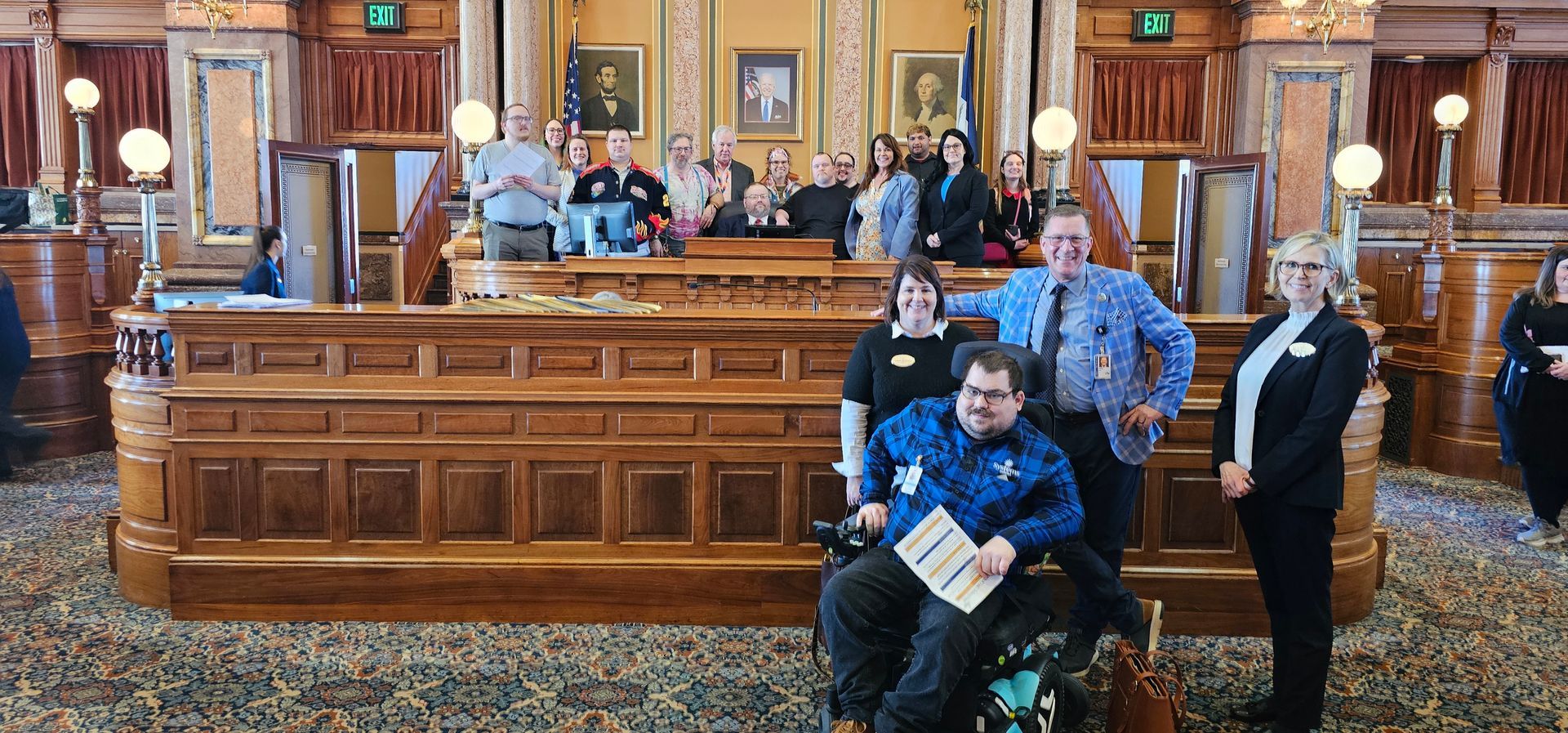
Advocates from Systems Unlimited inside the Iowa House with Representatives Hans Wilz, Elinor Levin, Art Staed, Tracy Ehlert, and Elizabeth Wilson.

Slide title
University of Iowa REACH students met an unexpected visitor at the Capitol. Captain America was talking to his legislators that day as well.
Button
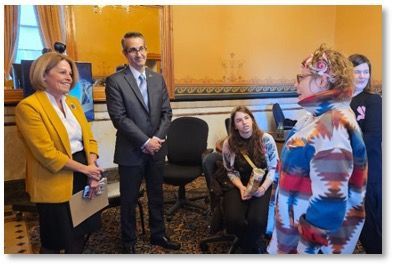
Systems Unlimited advocates talk about their issues with Representatives Ann Meyer and Joel Fry.
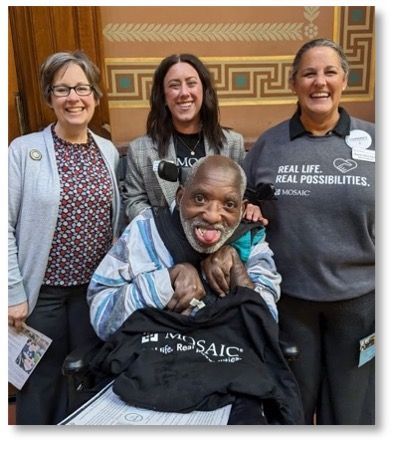
Mosaic advocate Monte and staff meet with Rep. Heather Matson during their visit to the Capitol.
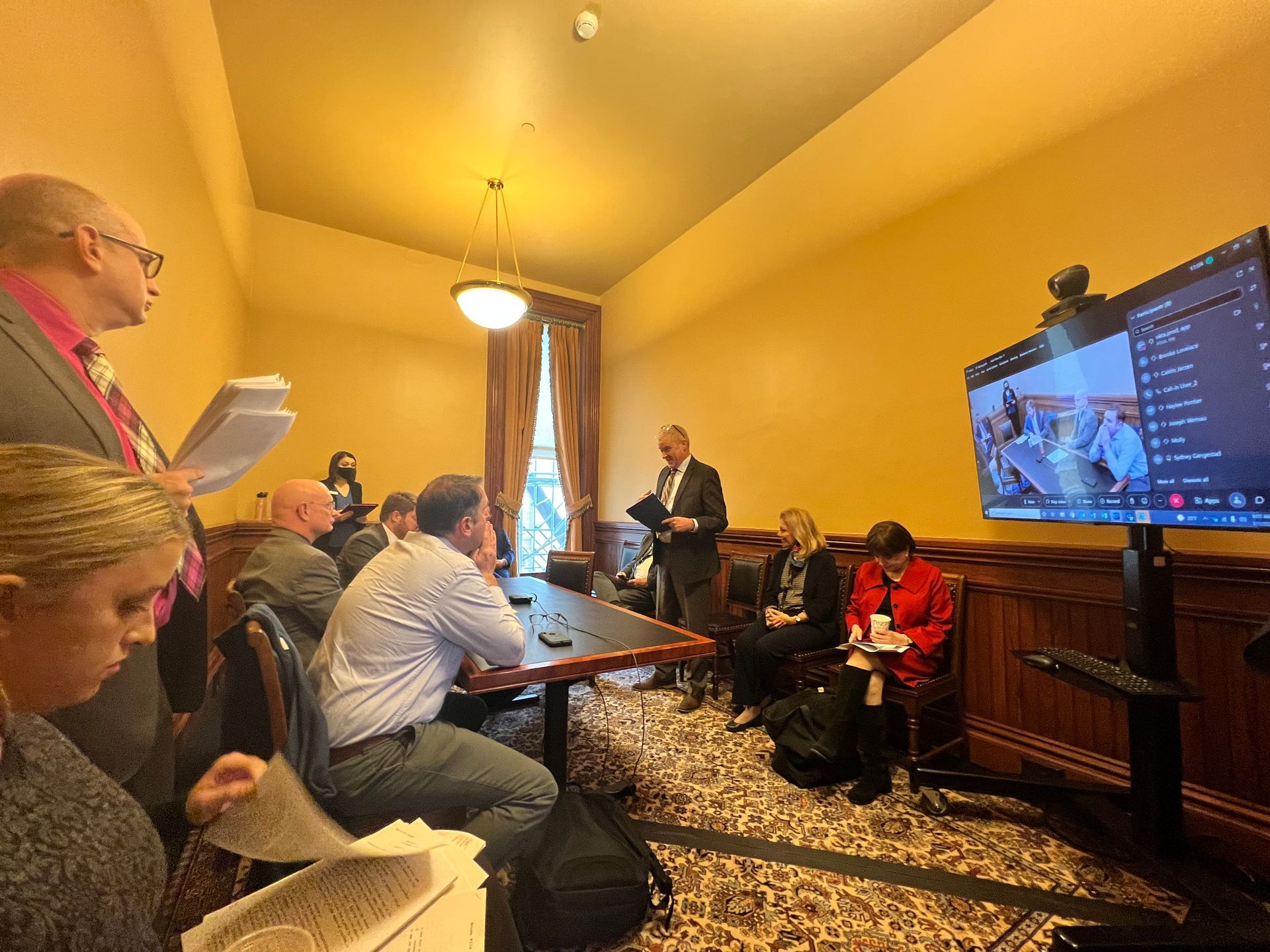
Advocates for guardianship and conservatorship law changes testify at a subcommittee meeting.
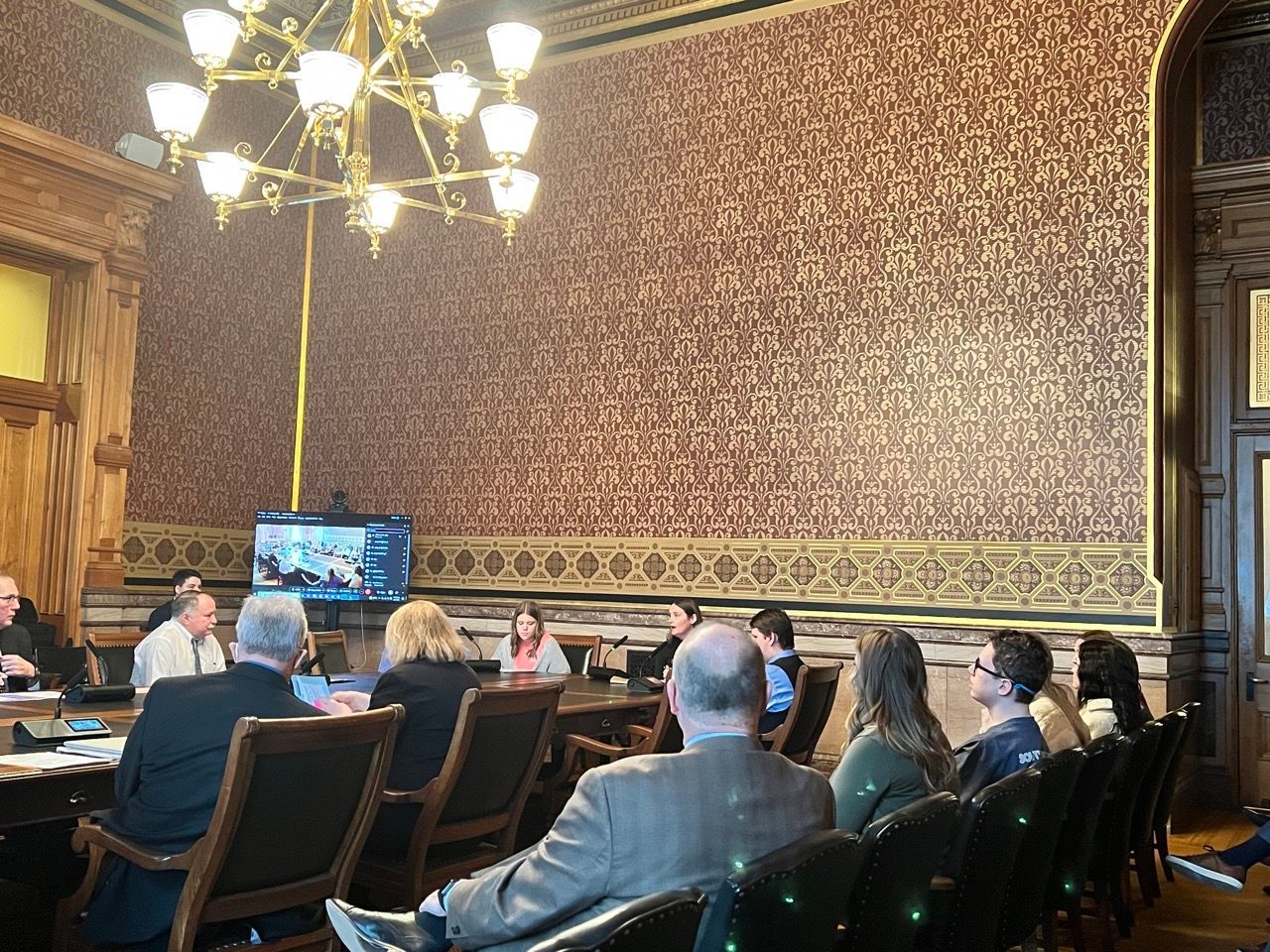
Slide title
Write your caption here
Button
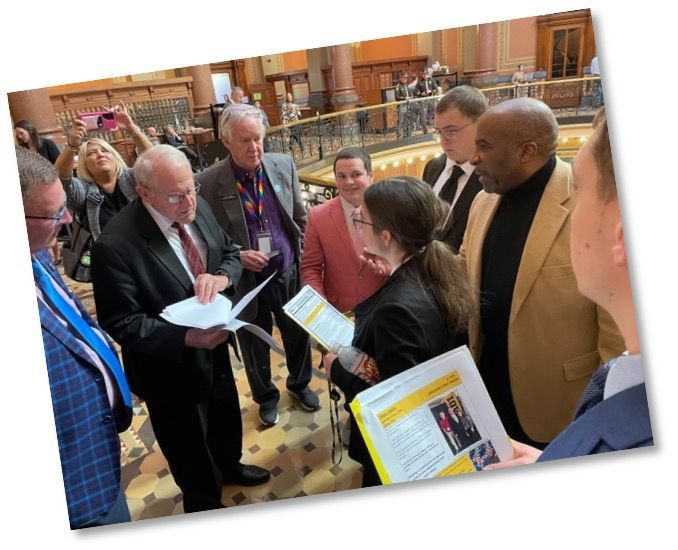
University of Iowa REACH students meet with Sen. Ken Rozenboom, the Senate Education Chair, and others to talk about scholarships for programs like REACH.
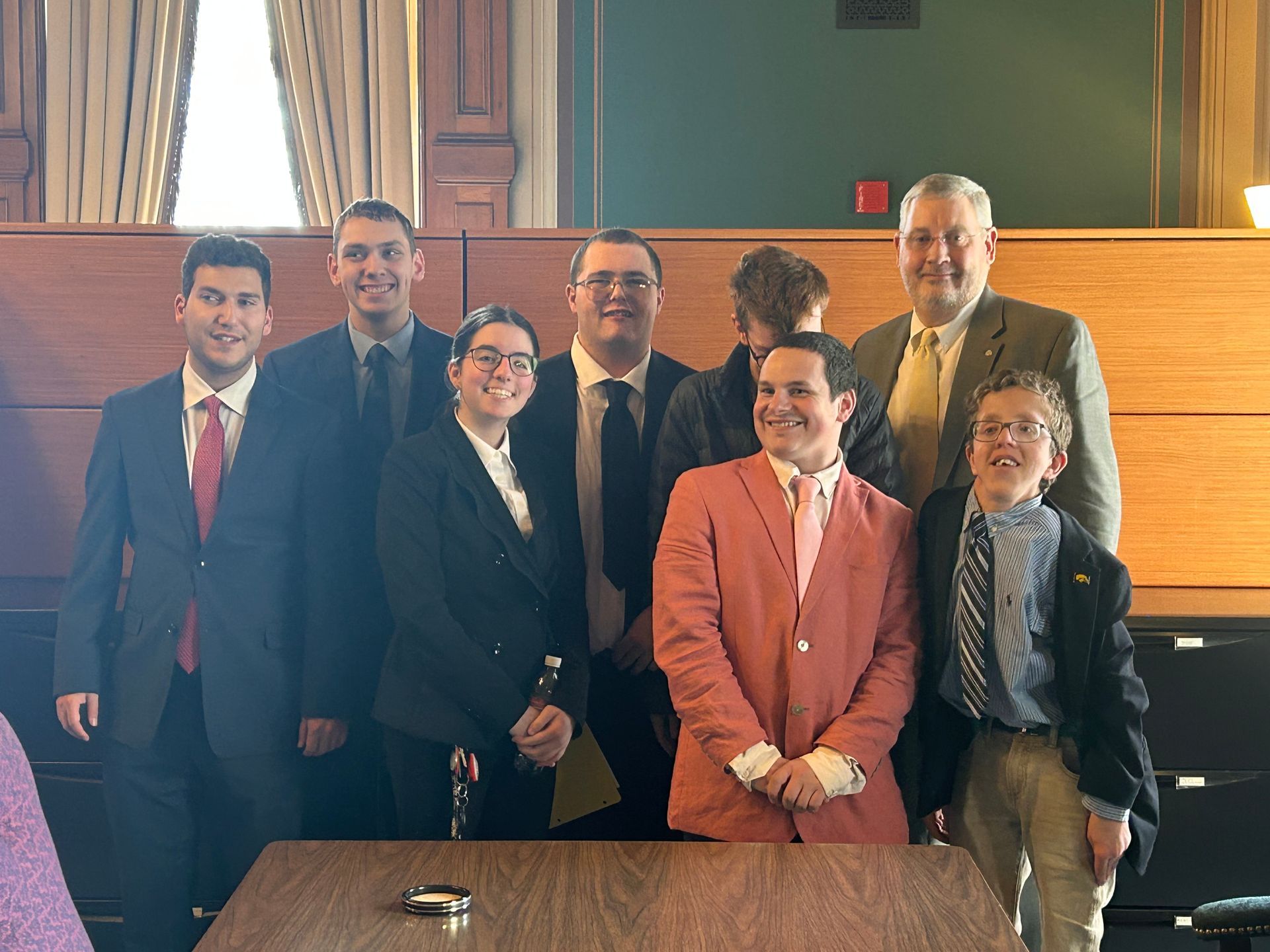
UI REACH students pose for a photo at the Capitol.
Opportunities for Feedback & Advocacy
HOME Comments Due May 17
Iowa HHS wants to make sure Iowans can access high-quality behavioral health, disability and aging services in their homes and communities. This Hope and Opportunity in Many Environments (HOME) project is developing ideas to improve HCBS and Iowa’s waiver system.
Guardianship & Conservatorship Survey
This year Iowa passed a law that sets new rules for guardians and conservators. A
"guardian" is appointed by the court to make decisions about the living arrangements and other personal care of a person with “diminished decision-making capacity.” A
"conservator" is appointed by the court to manage the financial affairs of a person “with diminished decision-making capacity.”
The University of Iowa’s Institute on Guardianship and Conservatorship is working with the Iowa DD Council and other partners to make videos explaining guardianship and conservatorship. These videos will include what is needed for reporting. We want to help people in a way that does not require them to hire a lawyer. To do that, we want to learn more about your needs in this area.
Please take a few minutes to tell us your thoughts by taking this
online survey
(you can also use the QR code to get to the form.
May & June Capitol Chats
Signup for our upcoming Capitol Chats
here.
- Friday, May 31 (11 am – Noon):
Join advocates Alex Watters, Jen Wolff, and others to talk about the importance of voting in the June 4 primary election.
- Friday, June 28 (11 am – Noon):
Join special guests to talk about advocacy over the summer and look at some issues being discussed in Congress. This is a great opportunity for advocates to share what they want legislators to work on in 2025.
Legislative Retirements
There are 16 legislators not running again. That means there will be someone new taking that seat in 2025. Seven legislators will face a primary challenge in the June 4 primary. That means they will have to run against someone in their own party. We will take a closer look at elections in our summer issue. Check the Iowa DD Council's
voter resources,
primary candidate list, and
Secretary of State's website for more information about voting.
Legislators Not Running in 2025 (Retiring)
- Sen. Jeff Edler (R-Marshall)
- Sen. Pam Jochum (D-Dubuque)
- Sen. Todd Taylor (D-Linn)
- Rep. Ako Abdul-Samad (D-Polk)
- Rep. Brian Best (R-Carroll)
- Rep. Ken Carlson (R-Monona)
- Rep. Dave Deyoe (R-Story)
- Rep. John Forbes (D-Polk)
- Rep. Joel Fry (R-Clarke)
- Rep. Stan Gustafson (R-Warren)
- Rep. Anne Osmundson (R-Clayton)
- Rep. Art Staed (D-Linn) -
he is leaving the House but running for Senate (Todd Taylor's seat)
- Rep. Sharon Steckman (D-Cerro Gordo)
- Rep. Brad Sherman (R-Iowa)
- Rep. Luanna Stoltenberg (R-Scott)
- Rep. Phil Thompson (R-Boone)
Legislators with Primaries
- Sen. Waylon Brown (R-Mitchell)
- Sen. Claire Celsi (D-Polk)
- Rep. Jane Bloomingdale (R-Worth)
- Rep. Elinor Levin (D-Johnson)
- Rep. Josh Meggers (R-Grundy)
- Rep. Mike Sexton (R-Hardin)
- Rep. David Young (R-Dallas)
News
By amy
•
29 Apr, 2024
2024 Session Ends on Day 104
13 Apr, 2024
Budget Bill Tracker: Links to State Budget Bills & Spreadsheets Updated Daily
29 Mar, 2024
Legislative Leaders Release Budget Targets, All Spend Less Than 99% Allowed
Show More















